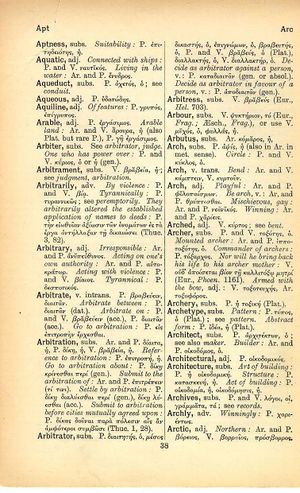arbutus: Difference between revisions
From LSJ
Ὡς αἰσχρὸν ἀνθρώποισίν ἐστ' ἀπληστία → Quam turpe hominibus est intemperantia → Wie schändlich ist doch für die Menschen Völlerei
(D_1) |
(Gf-D_1) |
||
| Line 1: | Line 1: | ||
{{Woodhouse1 | {{Woodhouse1 | ||
|Text=[[File:woodhouse_38.jpg|thumb|link= | |Text=[[File:woodhouse_38.jpg|thumb | ||
|link={{filepath:woodhouse_38.jpg}}]]'''subs.''' | |||
Ar. [[κόμαρος]], ἡ, | Ar. [[κόμαρος]], ἡ, | ||
Revision as of 07:24, 14 August 2017
English > Greek (Woodhouse)
subs.
Ar. κόμαρος, ἡ,
Latin > English (Lewis & Short)
arbŭtus: i, f. kindr. with arbor, since the arbutus was abundant in Italy,
I the wild strawberry-tree, the arbute, arbutus: Arbutus unedo, Linn.; Ov. M. 10, 102; cf. Verg. G. 2, 69; Col. 7, 9, 6; 8, 10, 4; Plin. 15, 24, 28, § 99; 23, 8, 79, § 151 al.; its fruit, like that of the oak, was anciently the food of men; cf. arbutum. Under it the goats were fond of grazing: dulce satis umor, depulsis arbutus haedis, etc., Verg. E. 3, 82; so Hor. C. 1, 17, 5; and idle men of reposing: nunc viridi membra sub arbuto Stratus, Hor. C. 1, 1, 21.
Latin > French (Gaffiot 2016)
arbŭtus,¹³ ī, f., arbousier : Virg. G. 2, 69.

